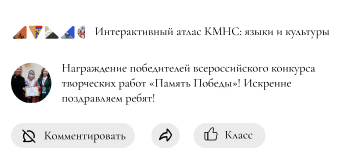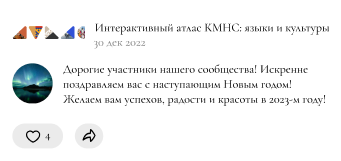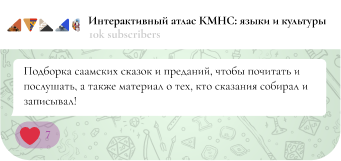|
|
Institute of Ethnology and Anthropology, Russian Academy of Sciences
Anna Sirina
|
The Evenks. Modern culture and crafts, folklore groups, professional art
Today, Evenk folklore is in a critical state owing to falling numbers of Evenks engaged in the traditional economic and cultural practices and the indigenous language essentially dying out. The UNESCO classifies the Evenk language as “critically vulnerable.” Consequently, the problem of protecting Evenk culture is very urgent. Currently, Evenks are searching for new forms, means, and methods of expressing their cultural life. Evenk singers and dancers perform at various festivals that are both intra- and inter-regional. There are professional and amateur folklore ensembles, and virtually every Evenk village has its amateur folklore ensemble. The state also supports Northern peoples’ contemporary cultural production. The ensembles’ repertoires feature choreographic performances, dances, improvised fairy tales, legends, and rites. Interest in ethnic songs, dances, and applied arts is stimulated by performances of various folklore ensembles such as Enneken and Girkilen (Yakutia), Ulgen, Udya, Tokogon, Begokan (Evenk District), Dyugeldyn Northern dance ensemble, Gudyay Dunne amateur ensemble (Amur region) and many other groups. In 2019, Yakutia held the Ayukta Evenk folklore festival.
Evenks’ professional literature took off when the Evenk writing system was developed in the 1930s and literacy levels went up. Russian writers wrote about Evenks, too, for instance, Vyacheslav Ya. Shishkov, Mikhail Osharov, Grigory Fedoseyev, and others. Evenk literature typically turned to the Evenk epic traditions. Since the late 1940s, Evenk authors produced autobiographical stories and novellas, in the late 1980s and 1990s, they turned to “novelistic tales.” Evenk literature is to a large degree non-fictional and autobiographic. Evenk writers write and publish in the Russian, Evenk, and Yakut languages.
There are many talented Evenk artists, both amateur and professional, for instance, Semyon Nadein, Anton Egorchyonok, Oleg Vasiliev, Valeriy Kondakov, and Sergey G. Salatkin. Victor P. Vlasov, Semyon A. Gorbunov, Yelena V. Zaboyenkova, Victor V. Shkorkin, and many others.






















































